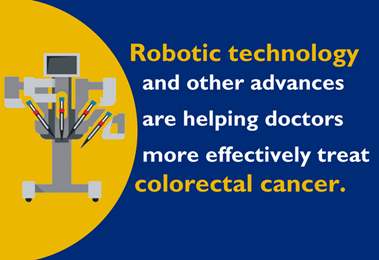Colon Cancer Treatment
If you have colon cancer, your treatment team will include medical oncologists, surgeons and radiation oncologists. These specialists will work together to develop the best treatment plan for your condition.
Colon cancer treatment will depend on how early the cancer is caught. Sometimes, your doctor can remove polyps during a colonoscopy and no further treatment is necessary. Other times, you may need surgery and/or chemotherapy.
Colon Cancer Treatment Strategies by Stage
Determining the stage (extent) of the disease is an important step in designing the best, most effective treatment regimen. The stage will help determine when and how various treatment methods are used.
Early Stage Disease
Approximately 39 percent of colon cancer patients have localized disease, according to the American Society of Clinical Oncology. The most common treatment for early stage colon cancer is surgery. Some patients with early stage disease may also receive chemotherapy after surgery. For patients with localized colon cancer, the five-year survival rate is 90 percent.
Late Stage Disease
When colon cancer metastasizes (spreads), it usually appears in the liver. It may also spread to the lungs, brain, peritoneum (the lining of the abdominal cavity) and/or distant lymph nodes. For patients with this type of late stage disease, the five-year survival rate is 14 percent. (Patients whose colon cancer has spread to surrounding tissues or organs and/or regional lymph nodes have a five-year survival rate of about 71 percent.)
If colon cancer has spread to nearby lymph nodes but not to other parts of the body, surgery may be used followed by chemotherapy. When the disease has spread to distant sites, chemotherapy may be used as the primary treatment, especially if surgery is unlikely to cure the cancer. If the disease has spread in the form of a small number of distant tumors, surgery may be used to help cure the disease or extend the patient’s lifespan.
Other treatment options for late stage gastrointestinal cancers may include cytoreductive (debulking) surgery and hyperthermic intraperitoneal chemotherapy (HIPEC). The procedures have proved to be an effective treatment option for certain peritoneal surface malignancies and other gastrointestinal cancers.
Innovative therapies are being developed to give patients with advanced stage disease more options. Some patients may participate in clinical trials to try these new therapies.
Treatment Options
Your specific course of treatment will depend on the exact location of the cancer and how early it was found. Treatment for colon cancer includes:
Endoscopic Treatment
Often, polyps are safely removed during a colonoscopy. Some very large polyps may be removed without surgery by specially trained gastroenterologists known as therapeutic endoscopists. If the polyps were large, your doctor may have marked the polypectomy (polyp removal) site with a special ink during the colonoscopy. Marking the area can help during subsequent surveillance colonoscopies.
In general, patients with small polyps do not have an increased risk of developing colon cancer and should follow regular screening guidelines. For patients with larger polyps or with more than three polyps, follow-up colonoscopies should be performed more frequently. Consult your doctor about your recommended screening schedule..
Surgery
The treatment of choice for colon cancer is surgical resection, which involves removing the cancer through surgery. Surgery is performed to remove the cancer completely and reconstruct the bowel, if possible, so your postoperative bowel function is normal or near normal.
Factors that Impact Surgical Technique
Your specific colon resection strategy will depend on many factors, including the following:
-
The location of the tumor
-
The presence of other cancers or polyps
-
The stage of the cancer
-
The risk of developing colon cancer in the future
-
Your preferences
During the resection, the surgeon removes the part of the colon that contains the cancer as well as a small portion of surrounding normal tissue. The surgeon may also remove lymph nodes and check them for cancer. If the cancer is completely removed during surgery and confirmed to be early-stage disease, no further treatment is needed. If cancer cells are found in the surrounding tissue or lymph nodes, your doctor may recommend adjuvant (meaning “in addition to”) chemotherapy.
Surveillance Following Surgery
Following colon cancer surgery, vigilant monitoring is a critical part of follow-up care. There is a risk of recurrence, especially if the cancer involved the lymph nodes. After your surgery, your doctor will see you at the following times:
-
At three- to six-month intervals for three years
-
After that, every six to 12 months for five years
Colonoscopies are also important. One year after your colon cancer surgery, you will have a colonoscopy. Then, you will have a colonoscopy every one to three years after the first surveillance colonoscopy to check for new polyps or cancer.
Routine evaluation, physical exams and blood tests are important for your postsurgical evaluation and are the best ways to monitor recurrent disease.
Chemotherapy
Chemotherapy drugs travel through the bloodstream to destroy tumor cells that may have broken away from original tumor and could begin to grow again elsewhere in the body. They may be administered orally or intravenously.
Chemotherapy can be used at various stages of colon cancer treatment. Sometimes, chemotherapy is given prior to surgery to shrink a tumor and reduce the extent of surgery. This is called neoadjuvant therapy. In more advanced cancers, you may need a course of chemotherapy following your surgery. This type of chemotherapy is generally administered on an outpatient basis.
Chemoradiation (chemotherapy combined with radiation therapy) may also be used after surgery. For some patients, chemotherapy can make radiation more effective in the treatment of colon cancer. (Radiation therapy is not commonly used for colon cancer treatment.)




